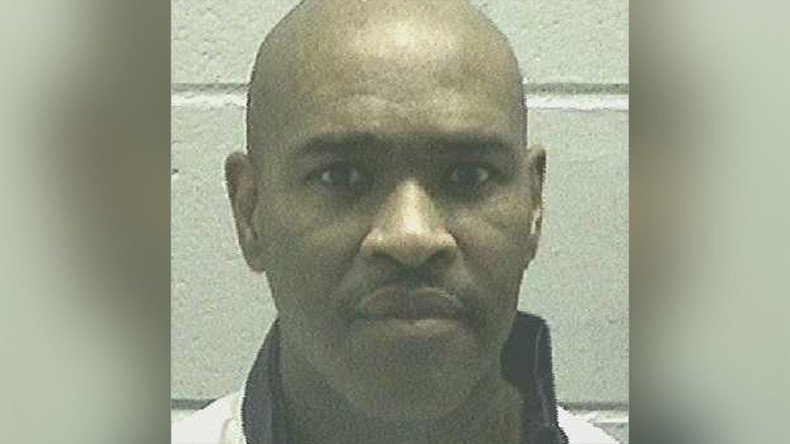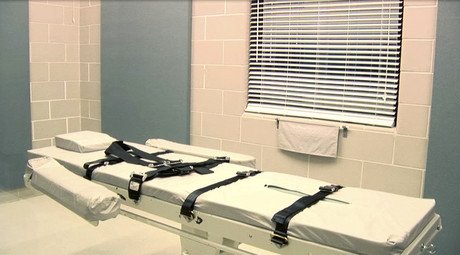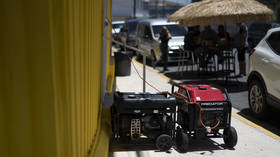Georgia inmate 'winced' in pain during 1-hour execution procedure

Georgia performed the US’ final scheduled execution of the year after the Supreme Court decided against a stay of execution for inmate Brian Keith Terrell. The inmate reportedly "winced" in pain several times during the one-hour procedure.
Terrell’s execution marks the 28th performed this year, according to Amnesty International. Notably, this is the lowest number of executions in one year since 1991.
However, it took approximately one hour for the nurse to successfully insert IVs into Terrell's arms, according to the Atlanta Journal-Constitution. Ultimately, the nurse placed the IV in his right hand.
During this time, Terrell "winced several times, apparently in pain," the outlet reported.
The procedure itself also began hours after it was initially scheduled, since Terrell's attorneys had appealed to the Supreme Court hoping for a stay of execution. The appeal was denied around 11:00pm.
“The application for stay of execution of sentence of death presented to Justice Thomas and by him referred to the Court is denied. The petition for a writ of certiorari is denied,” wrote the US Supreme Court on Tuesday.
#SCOTUS DENIES Brian Terrell's stay of execution requests from Georgia. No noted dissents. https://t.co/xOiO49Fc46pic.twitter.com/xPY0cRRY4a
— Chris Geidner (@chrisgeidner) 9 декабря 2015The nation’s highest court received a late filing from Terrell’s defense attorneys on Tuesday evening for a stay of execution and a “writ of certiorari,” which is a request for the court to review a lower court case. Both were denied at 11pm, and no explanation was given, according to the Associated Press.
Brian Keith Terrell was scheduled to be executed at 7pm, but the time was delayed as his lawyers made a series of late filling to the Supreme Court.
Standing in vigil at the GA State Capitol against the execution of Brian Keith Terrell. #deathpenalty#BrianTerrellpic.twitter.com/ajuDSxe5KD
— Erik Wilkinson (@erik_wilkinson) 9 декабря 2015Terrell was convicted of murder in the June 1992 killing of a 70-year-old man. Earlier in the day, the Georgia Supreme Court and an appeals court declined to halt the execution.
In a federal court filing, Terrell’s lawyer argued an Eighth Amendment claim that the state could not ensure the safety and efficiency of the drug it planned to use in his execution. State attorneys said the state had taken precautions to ensure the drug was not defective and would not proceed with a faulty drug.
Terrell’s lawyers also argued that Terrell was innocent and that state prosecutors used false and misleading testimony to get a conviction. State lawyers said courts had already heard and rejected the defense’s arguments.
Terrell was on parole in June 1992 when he stole and forged checks, totaling $9,000 belonging, to John Watson, a friend of his mother’s, according to court records. Watson confronted Terrell’s mother and said he would not press charges if Terrell returned most of the money within a couple of days. Prosecutors said that, instead, the next day Terrell shot Watson multiple times and severely beat him, according to the AP.
The case relied on the testimony of Terrell’s cousin, who said Terrell told him he had killed Watson. The cousin later said he lied because police threatened him, but refused to sign an affidavit saying so, according to Terrell’s attorneys.
On Monday, the Georgia parole board denied clemency after a hearing. Terrell had three trials and several execution dates. The first trial ended in a hung jury. In his second trial, Terrell was convicted of malice murder and forgery, but the state courts ordered a new trial. In this third trial, Terrell was sentenced to death.
Terrell was first scheduled to be executed in March, but the state halted it since its lethal injection drug had particles floating in it, BuzzFeed reported. The state said this was because the drug was stored at too cold a temperature. BuzzFeed discovered the state was trying to bury the findings of the investigation, and pressed for its release. Ultimately, the results did not support the state’s conclusion that it was due to temperature and not a problem with mixing the drug.
Prisons across the US are experiencing problems with lethal injections and have had to rely on drugs from compounding pharmacies, which mix up the drugs for a specific purpose.
Terrell’s attorneys argued this process was not reliable, and that it could subject him to an unconstitutional death. His attorneys proposed finding a better compounder.













